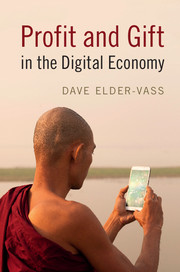9 - User content capitalism
from Part III - Digital economies
Published online by Cambridge University Press: 05 July 2016
Summary
Introduction
This chapter turns to a different kind of hybrid economic form, though one that is often combined with the advertising form discussed in the previous chapter. The cases it discusses articulate two types of appropriative practice: first, as in the last chapter, gifts of services from commercial websites to ordinary users, and second, the unpaid creation of resources on these sites – resources that are crucial to the attractiveness and thus the commercial success of the free service itself – by some or all of those same ordinary users.
Those cases are YouTube (owned by Google), currently the dominant video-sharing site on the Internet, and Facebook, currently the dominant social networking site. At first video content on YouTube was provided entirely by ordinary users and it still obtains much of its content in this way, though it also now hosts commercially produced content. Facebook's service is centred on giving users access to material (including status updates, photos, and videos) provided by their friends on the site. Both depend to some extent, and Facebook almost entirely, on the provision of content by users to make the service attractive to other users. Both then use the traffic this generates – and the related personal information about their users – to generate revenue from targeted advertising. In principle, however, the practices discussed in this chapter could be articulated with other revenue-raising practices instead. Facebook, for example, has experimented with putting ‘Buy’ buttons on its pages, to produce a commission or sales-based revenue stream (Duke, 2014), and also earns revenue from partners whose games it hosts (Van Grove, 2013).
This chapter examines the appropriative practices that combine to produce this form of capitalism, marked by its dependence on user-generated content. Like most other massive web businesses, these ones are utterly dependent on attracting large volumes of user traffic to sustain the viability of their business model, and once again we will see that practices designed to secure user attachment are of the utmost importance to them. Giving services as a gift is only part of this: the services must also be attractive, and user dissatisfiers must be carefully managed to avoid driving traffic away from the site.
- Type
- Chapter
- Information
- Profit and Gift in the Digital Economy , pp. 192 - 215Publisher: Cambridge University PressPrint publication year: 2016



